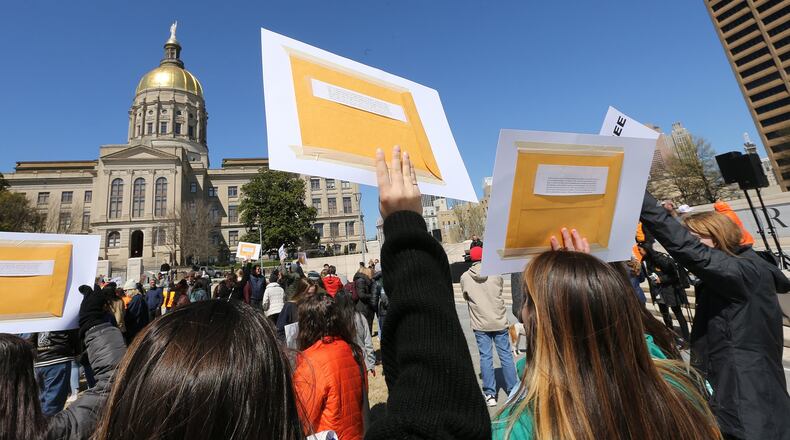Most of the attention during the national student walkout was focused on high schools. After all, it was last month’s deadly shooting at Marjory Stoneman Douglas High School in Parkland, Fla., that led to Wednesday’s protest.
But students and professors at some metro Atlanta colleges knew the protest wasn’t just about one age group, or even about one shooting.
A group of students and faculty from Emory University gathered at 10 a.m., holding signs bearing slogans such as “protect children not guns” and “enough is enough.”At Georgia Tech, the Progressive Student Alliance estimated that 70 people showed up for 17 minutes of silence — a minute for each of the people killed in Parkland — and about 20 of them walked to the State Capitol to lobby for gun law changes.
MORE: Metro Atlanta students walk out, meet resistance and support
MORE: Georgia Democratic legislators stage walkout against school gun violence
Elise Wade, a junior at Kennesaw State University, was planning to walk out of her Theater and Society class whether she was given an official green light or not. So the pre-med student was glad when Professor Matthew Lewis announced he was walking to the campus green, an open grassy area sometimes used for protests – such as when some students and faculty wanted former KSU president Sam Olens to resign.
Lewis told his students they were welcome to join him or stay behind. Wade, 18, appreciated that he made his thoughts clear when some schools had been ambiguous about what was allowed.
“Schools are pushing it down; he’s pushing it up,” the junior from Gwinnett said.
The Cobb County school district, unlike Atlanta and DeKalb, warned students of possible disciplinary action for disruptive demonstrations, but didn't specify what repercussions would be.
Chris Preheim, one of five students from the same printmaking art class who walked out, said their professor encouraged them to participate. The nationwide walkout is evidence that the discussion on guns has snowballed enough to where Parkland shooting survivors “can voice their concerns loud enough to be creating action,” the graphic communications major said.
“Thoughts and prayers” sent after atrocities are comforting, the 21-year-old senior said, but they don’t stop tragedies from repeating. He said he’d like to see funding for the Centers for Disease Control and Prevention to study homicides and mass-shooting statistics.
RELATED: Stoneman Douglas town hall: 'We’re not a generation to stay silent'
More than 20 people gathered on the campus green. Meanwhile, KSU student Katie Jordan demonstrated at the Capitol.
Jordan said mass shootings were her generation’s version of major social upheavals during the Vietnam War.
“We don’t want to think, ‘Am I going to go to school and come back?’ ” she said. “This has gone on far too long. And the kids who have lived through this are finally coming of age and putting a stop to it.”
Some changes have already been made since the Parkland shooting, such as a new Florida law that raised the purchase age for firearms from 18 to 21 year of age — a law the National Rifle Association has filed a lawsuit against.
But Wade, the KSU pre-med student, thinks more needs to be done. She said it was especially important to protest in light of the “campus- carry” bill signed into Georgia law last year, which lets guns be carried on most parts of college campuses.
“People say the protest won’t matter in colleges because attendance isn’t mandatory, but we’re still standing in solidarity,” Wade said. “It could’ve been us, or our kids.”
About the Author
The Latest
Featured


